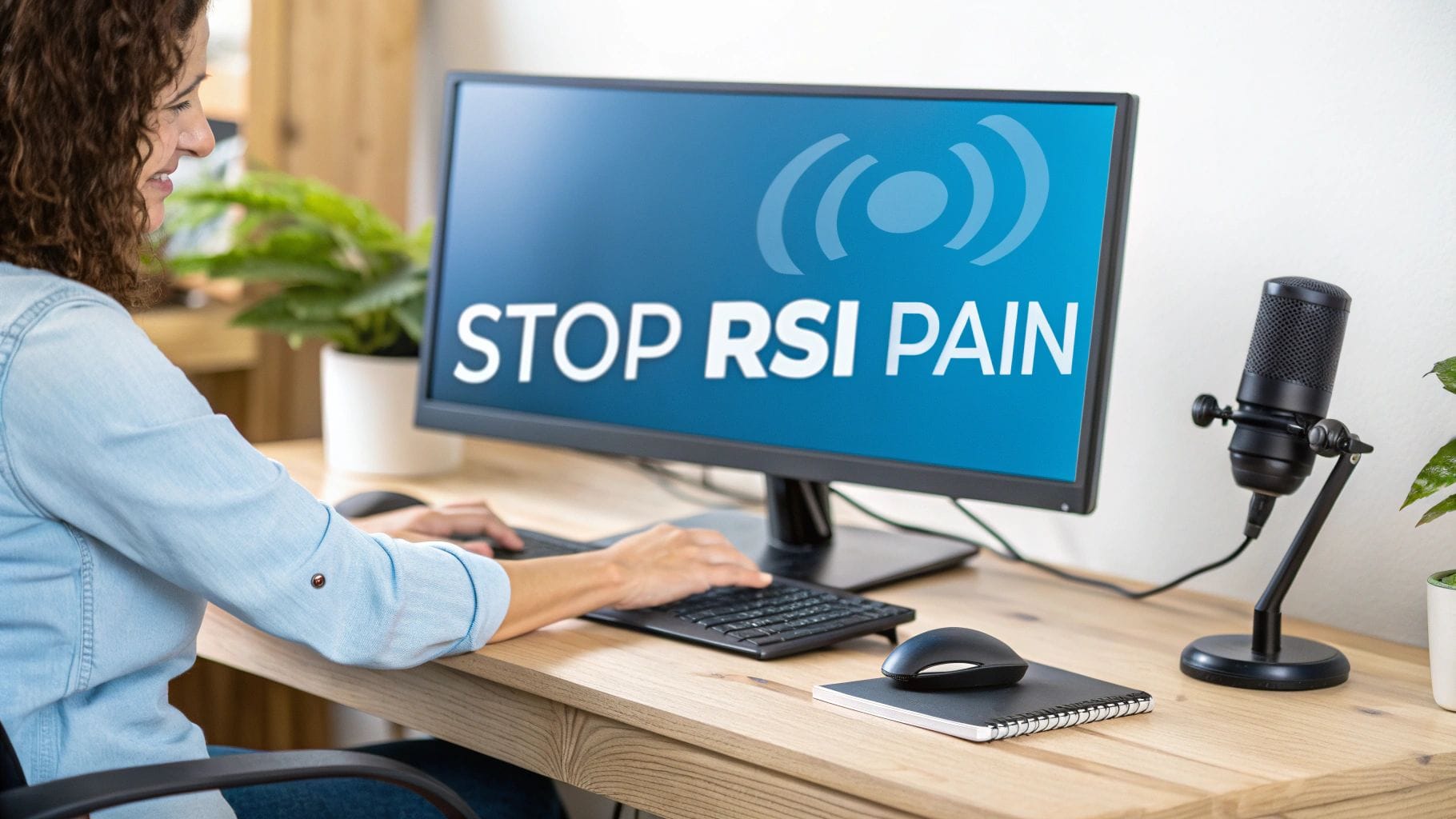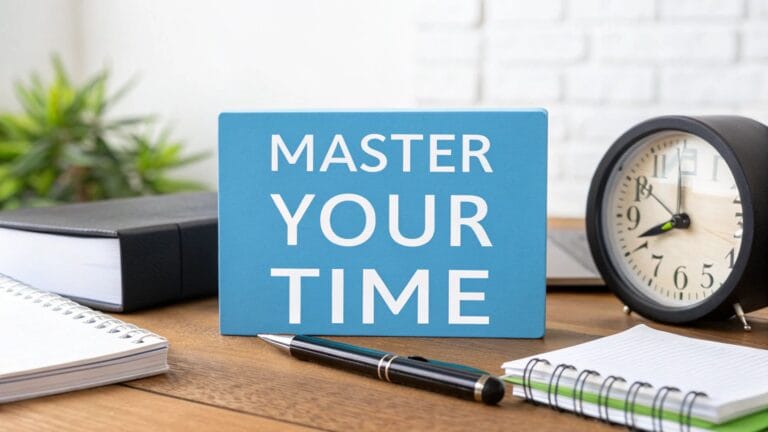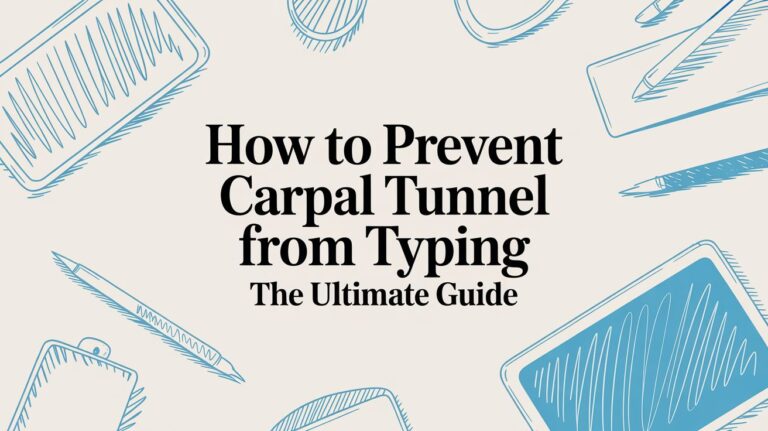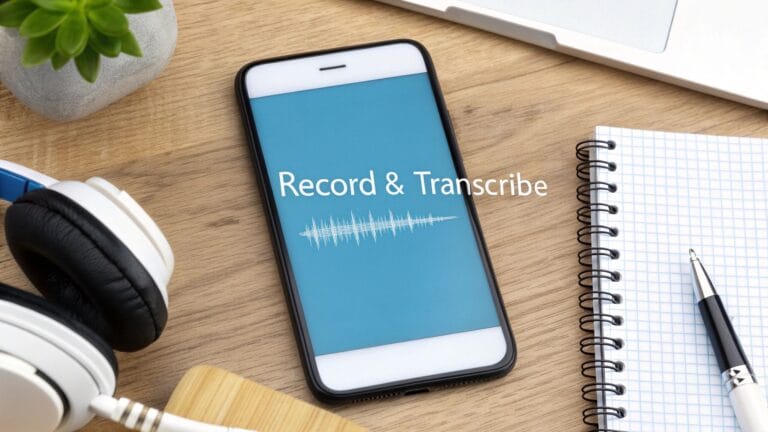How to Stop Ouchies From Doing Things Over and Over
To stop your body from hurting when you do the same thing a lot, you just need to make small, smart changes. You don't have to change everything. You just need to make your desk fit your body, take little breaks to stretch, and not do the same moves for hours and hours.
Think of it like giving your muscles little naps all day long.
What is a Repetitive Strain Injury?
Have you ever pulled a rubber band again and again in the same spot? After a while, it gets weak and might break. That’s like what happens to your body with a Repetitive Strain Injury, or RSI. It's when your body parts, like your hands or neck, start to hurt, feel weak, or get tingly because you moved them the same way too many times.
This ouchie doesn't happen from one big accident. It sneaks up on you from all the little things you do every day, like clicking a mouse, typing on a computer, or swiping on a phone. Each little move adds up. All that work on the same body parts makes them tired and sore, and they start to tell you they need a break.
Where You Feel the Ouchies
RSI usually shows up with a little ache that won't go away, a buzzing feeling, or like pins and needles are poking you. The most common spots I see this happen are:
- Hands and Wrists: These get tired from typing and using a computer mouse all day. This can cause problems like carpal tunnel syndrome, which makes your hands feel weak and tingly.
- Neck and Shoulders: That burning feeling you get from looking down at a laptop or your phone for a long time. We've all felt that!
- Elbows and Arms: This can happen if you grip things too hard for a long time, like a mouse, a tool, or even a steering wheel.
- Back: Sitting with a hunched back for a long time is a fast way to get a sore back.
The most important thing to know is that this ouchie isn't from one big fall. It's from doing thousands of tiny things that your body gets tired of.
Everyday Things That Can Cause Ouchies
The things that cause these ouchies are often hiding in your daily life. It’s not just about your job.
Someone who types a lot at work can get it. But so can a person who loves playing video games all weekend. A cook who chops food for hours is at risk, but so is someone who knits for fun.
Your first job is to be a detective for your own body. Find the moves you do over and over without thinking. Once you know where the hurt is coming from, you can make the simple changes in this guide to stop the ouchies before they even start.
Making Your Desk a Comfy Place
Your desk is where you do your work, but it might be secretly making you sore. When your desk isn't set up right for you, you have to bend and reach in funny ways. We can fix that. The goal is to make a desk space that helps your body, not hurts it. This turns your desk from a pain-maker into a helper.
This isn't just about feeling good right now; it’s about stopping big problems later. These ouchies cost a lot of money. In the United States, work-related ouchies cost $20 billion for doctors and another $100 billion because people can't work. A few small changes to your desk can keep you healthy and working well.
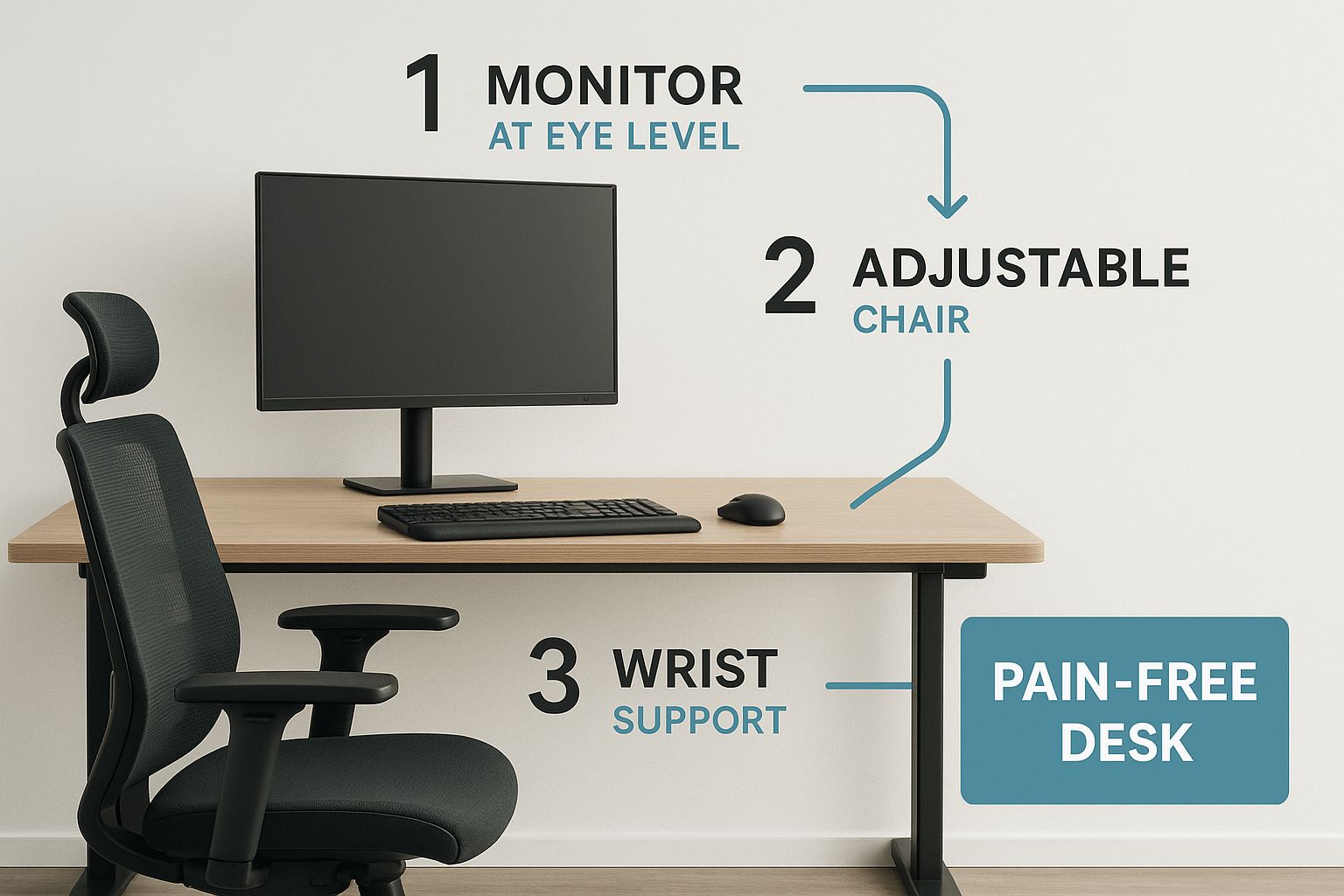
As you can see, a comfy setup isn't about buying one fancy thing. It’s about how your chair, screen, and keyboard all work together like friends.
Make Your Chair Your Friend
Your chair is the most important part. First, change the height so your feet can lay flat on the floor. If your feet are hanging, even just a little, your back has to work extra hard to keep you straight. That can make your back hurt.
Once your feet are flat, look at your knees. They should make a square shape, like the corner of a box. This takes the weight off your back. Last, make sure your lower back is touching the back of the chair so it gets a nice hug.
Here’s a little secret I tell everyone: If your feet don't touch the floor, use a little stool, a strong box, or even a pile of old books for your feet. It seems too easy, but this small change helps your whole body feel better.
Put Your Screen and Keyboard in the Right Spot
Next is your screen. The top of your computer screen should be at the same level as your eyes, or just a little bit lower. This is very important. It stops you from looking down, which is what gives you that sore "tech neck."
If your screen is too low, you don't need a new one. A pile of books or a special stand works great. The goal is to get it high enough so your neck can be straight and relaxed.
Now for your keyboard and mouse. They need to be close enough so your elbows can stay right next to your body, bent in that same comfy square shape. If you have to reach for them, you are making your shoulders and back work too hard.
- Keep Wrists Straight: Look at your wrists when you type. They should be straight, not bent up or down. A good way to think of it is how you hold your hand to wave "hello."
- Mouse Next Door: Keep your mouse right next to your keyboard. If you always have to reach far to the side for it, it can slowly hurt your shoulder.
- Tap, Don't Bang: Try to type with a soft touch. Tapping the keys gently instead of banging on them is much nicer to your fingers.
I made a little list to help you check your desk. Go through these things to make sure your space is helping you.
Your Comfy Desk Checklist
Use this easy list to fix your desk. Each check helps you make a comfy and healthy spot to stop ouchies.
| Desk Part | Easy Fix to Be Comfy |
|---|---|
| Chair Height | Feet are flat on the floor or a footrest. |
| Knee Place | Knees are at the same level as your hips, making a square shape. |
| Back Helper | Your lower back is touching the chair's back support. |
| Screen Height | Top of the screen is at the same level as your eyes or a little lower. |
| Screen Far Away | Screen is about one arm's length away from you. |
| Keyboard & Mouse | They are close to you so your elbows stay by your sides. |
| Elbow Angle | Arms are bent in a relaxed square shape. |
| Wrist Shape | Wrists are straight and relaxed, not bent up or down. |
Making these small changes might feel weird at first, but try to stick with them. They are your best defense against ouchies.
To be sure you have everything right, I really think you should look at this ultimate office ergonomics checklist to get your desk just perfect. It's a great helper. Remember, the small changes you make today stop the ouchies of tomorrow.
Easy Stretches and Mini-Breaks for Happy Muscles
Sitting still for a long time makes your body stiff and sore. Your muscles get stuck in one spot. The best way to stop this is to move a little bit, very often. These small habits can make a big difference.
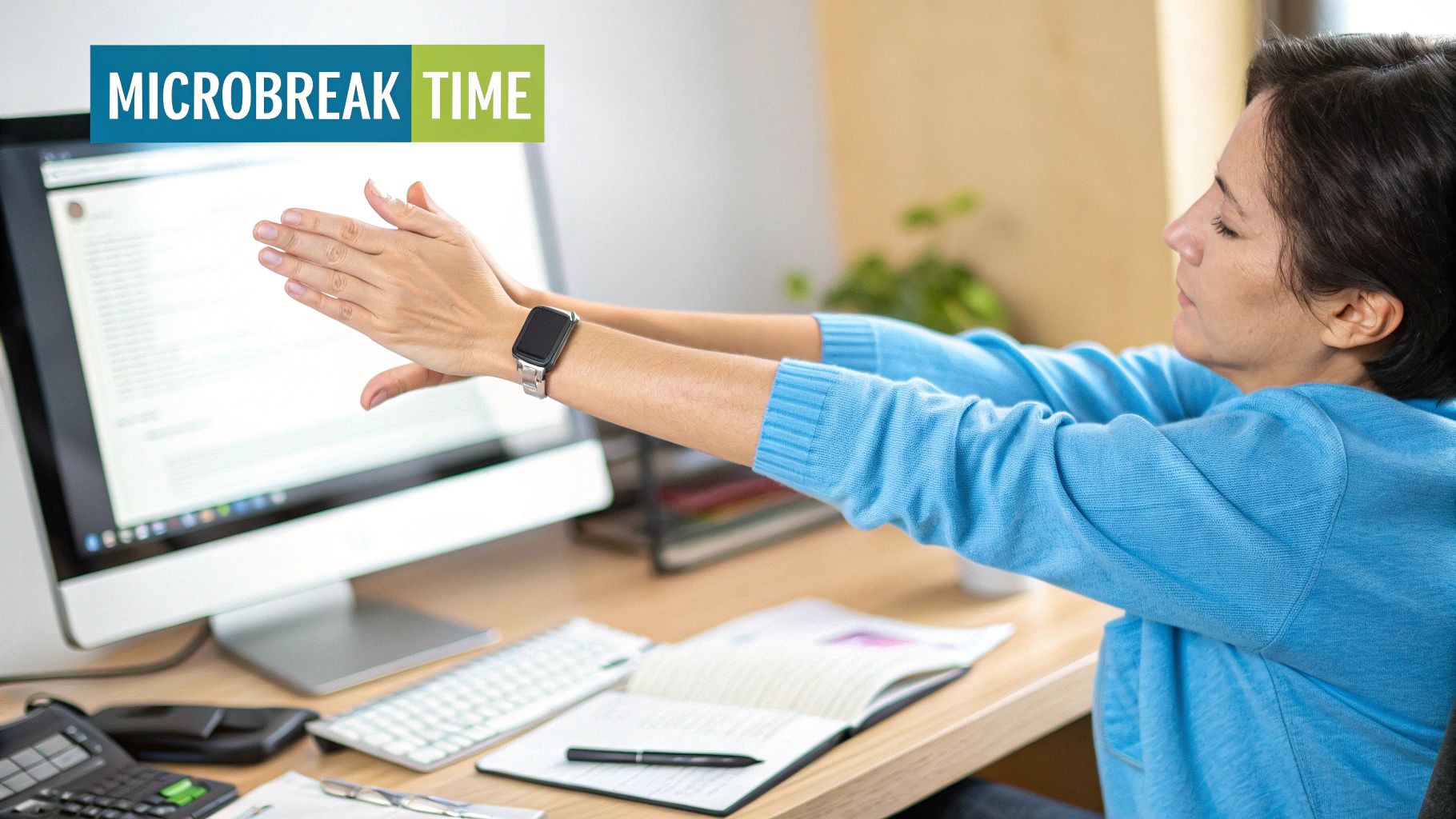
This is where a mini-break is a superhero. This is not a long lunch break. It's a quick, 30-second stop during your day. These tiny breaks are great at stopping the "doing-the-same-thing-over-and-over" cycle that causes ouchies.
What is a Mini-Break?
A mini-break is any short thing you do to change how you are sitting or standing and give your working muscles a rest. It can be as easy as standing up to look out a window, or getting up to get a drink of water.
The big idea is to just stop what you are doing and move. Think about holding something heavy. A mini-break is like putting that heavy thing down for a second. That short rest keeps your muscles from getting too tired and sore.
One study of people in offices found that taking short, frequent breaks—even just 30 seconds every 30 minutes—was better at stopping ouchies than taking two long breaks during the day.
Easy Stretches You Can Do Anywhere
You don't need a special mat or workout clothes to stretch. These are easy moves you can do right at your desk, and no one might even see you do them.
Here are a few gentle stretches to do during your day:
- Gentle Wrist Rolls: Hold your hands out in front of you. Slowly roll your wrists in circles—ten times one way, then ten times the other way. This is great for keeping the little parts in your wrists happy.
- Easy Neck Tilt: Sit up straight. Gently lean your head to the right, like you are trying to touch your ear to your shoulder. Hold it for about 15 seconds, then slowly do the other side. This feels so good for a tired neck.
- The "Stop" Stretch: Hold one arm out with your palm facing up, like you are telling someone to stop. With your other hand, gently pull your fingers back toward you. You will feel a nice stretch in your arm. Hold for 15-20 seconds and then switch hands.
Making It a Habit
The hardest part is remembering to do it. The easiest way to start is to set a timer on your phone or computer for every 30 minutes. When it rings, just stand up, do one of the stretches, and then go back to work.
Being ready like this is a big part of how to stop these ouchies. But it's not all up to you. Stopping these injuries is a job for everyone. There is even a special day called RSI Awareness Day to teach people about this. A good boss can help by giving you a comfy chair, telling you to take breaks, and teaching you safe ways to work. You can discover more about how workplaces can address and prevent RSIs right here.
By adding these tiny habits to your day, you give your body the little breaks it needs to stay healthy and happy.
Work Smarter: Using Better Tools to Stop Ouchies
What if you could give your hands a break without stopping your work? You can! The secret is to use smart tools that do the hard, repetitive jobs for you. Getting better tools is one of the best ways to stop ouchies.
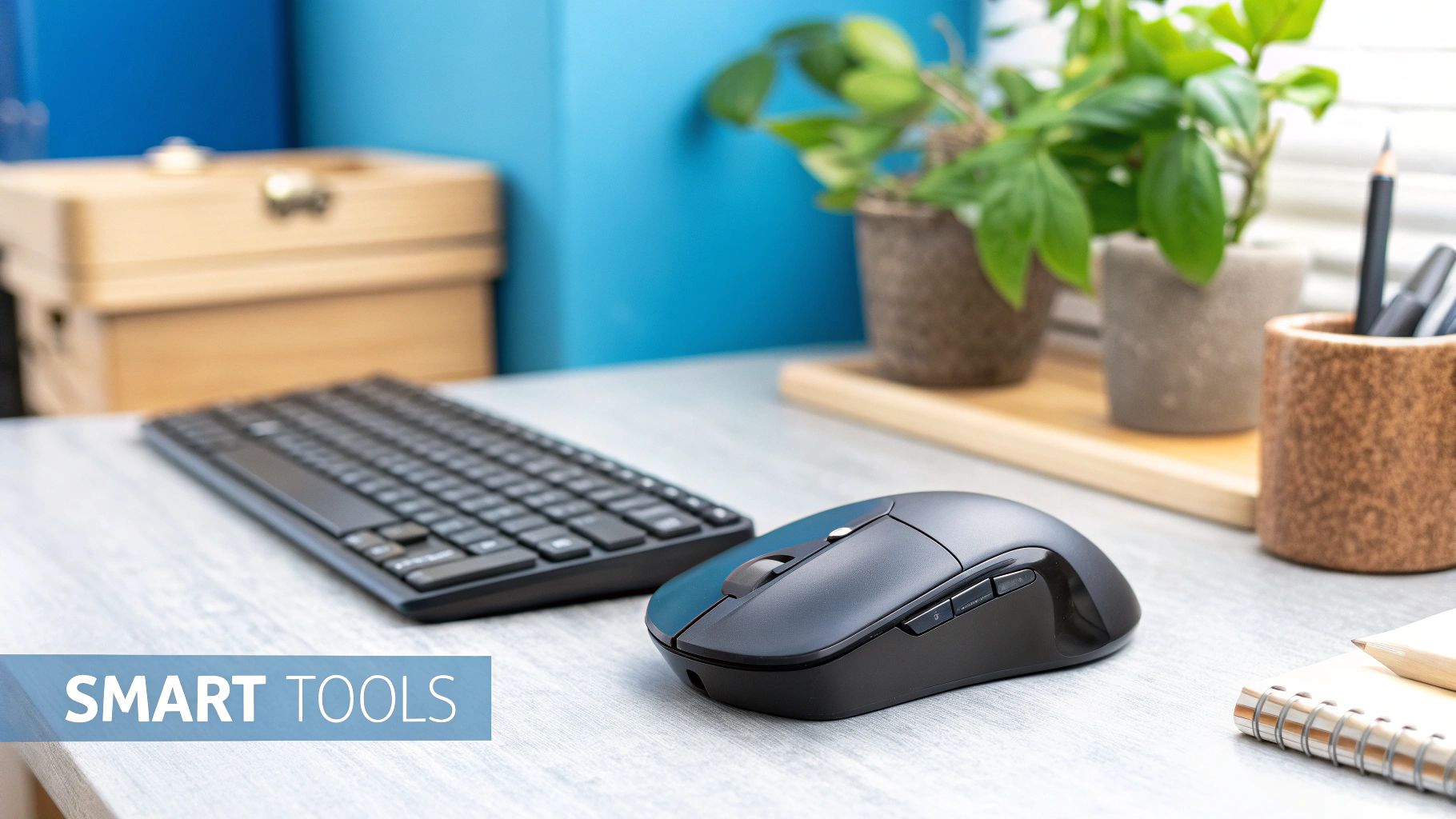
Think about it—how many thousands of times do you press a key on your keyboard every day? For people who write or work on computers a lot, those small moves add up. Over time, they can cause a lot of pain.
This is where a few special tools can make a huge difference, protecting your hands from getting too tired.
Let Your Voice Do the Typing
A computer program that turns your voice into words is not just a neat trick; it's a real lifesaver for anyone who might get an RSI. Instead of typing every word, you just talk, and the computer writes it for you. This one change gets rid of almost all the repetitive finger moves that cause ouchies.
Imagine writing a big report or answering emails just by talking. It lets your hands take a full vacation while you still get your work done. If you write a lot for your job, this tool can change how you feel every day. If you want to know more, you can learn about how voice-to-text software can work for you in our guide.
This is not just about stopping pain—it’s about working faster. Many people find they can say their ideas faster than they can type them.
A study found that talking your words is, on average, three times faster than typing. That means you're not only stopping ouchies but also getting more free time in your day.
A Better Keyboard and Mouse
Your keyboard and mouse are the two things your hands touch the most, so they need to fit your body perfectly. A normal flat keyboard makes your wrists bend in a weird way. A basic mouse makes you twist your arm to hold it. Special "ergonomic" tools are made to fix these problems.
- Ergonomic Mice: Many of these look different and are held like you're shaking someone's hand. This keeps your arm and wrist in a straight, happy line. It feels weird for a day, but it's worth it to stop the pain.
- Split Keyboards: These keyboards are split in the middle. This lets you put each half where your hands naturally want to be, which is about as wide as your shoulders. It stops you from squishing your elbows in and bending your wrists out.
Choosing the right tools is like finding shoes that fit just right; they stop pain and help you do your best. When you use a comfy desk setup and smart tools like voice-to-text, you build a strong shield against ouchies.
How Everyday Habits Away From Your Desk Cause Pain
We often think our desks cause our ouchies, but the truth is, the strain can build up even after you're done with work. It comes from all the little things you do every day—long after you close your computer.
The way you look at your phone, play video games, or even do a fun hobby can put a lot of stress on your body.
Think about how you are holding your phone right now. You are probably looking down at it, with your neck bent. This is what causes “tech neck,” a pain in your neck and shoulder muscles that can get really bad over time.
It’s a new problem for our world. A study showed that 9% of grownups in the U.S. had an RSI ouchie in the last three months. The number is even higher for people between 35 and 64 years old. This tells us that years of these small, repeated moves really do add up.
Your Phone Can Be a Sneaky Pain-Maker
The fix for tech neck is easy, but it might feel strange at first. Instead of looking down at your phone, lift it up so it's at the same level as your eyes.
This one small change keeps your neck straight and relaxed. It might not seem like a big deal, but by holding your phone up, you are stopping hours of strain on your neck and back every single day. The same idea works for tablets and books—bring them up to you instead of bending over them.
Making small, careful changes to how you do things every day is the key. You don't need a big plan; you just need to notice when your body is in a stressed-out position and gently fix it.
Hidden Ouchies in Your Hobbies
Your favorite things to do for fun can also cause pain if you're not careful. The goal is not to stop doing what you love, but to pay attention to your body no matter what you are doing.
Here are a few real examples of how to make your hobbies more body-friendly:
- For People Who Knit: Don't let your arms just hang in the air. Put a pillow on your lap and rest your elbows on it. This stops your shoulders from creeping up to your ears, which causes neck pain.
- For Gamers: Keep your wrists straight when you hold a game controller. It’s easy to let them bend down, but this hurts your hands. Remember to take breaks to stretch your fingers.
- For Readers: If you like to read in bed, use a lot of pillows to hold up your head and neck. Don't lie flat and bend your head way forward with just one pillow.
Even texting adds up. To give your thumbs a break, try talking to your phone instead of typing. Our guide on how to voice-to-text on your iPhone shows you an easy way to do this.
In the end, stopping pain is all about being more aware of these small moves. To make it a habit, it helps to explore effective habits to track and pay more attention to what you do each day.
Common Questions About Stopping Ouchies
It's normal to have questions about stopping these ouchies, especially when you hear so many different things. Let's talk about some of the most common questions. My goal is to give you simple, easy answers to protect your body.
What Are the First Signs I Should Look For?
The first signs of these ouchies are sneaky and easy to ignore. It is not usually a big, sharp pain. Instead, you need to listen for your body’s little whispers.
Watch for these small clues:
- A little ache that stays: Maybe your wrist or shoulder just feels a little tired or sore after a long day of work.
- Tingling or feeling numb: A "pins and needles" feeling in your fingers is a big clue, and it often happens at night.
- Feeling weak: You might find it's a little harder to hold your cup or open a jar.
These are not just small problems; they are your body's alarm bells. Finding them early is the best way to stop a little ouchie from turning into a big one.
Does Exercise Make Ouchies Better or Worse?
That’s a great question, and the answer is that it depends on the kind of exercise. Things like walking, swimming, or riding a bike are wonderful. They get your blood moving and keep your muscles strong.
But some hard exercises, if you do them the wrong way, can make things worse. For example, lifting very heavy weights with bad form could hurt your wrists and shoulders more. The trick is to do gentle stretches and easy exercises for the muscles that help your neck, back, and arms.
A common mistake is thinking you need a hard, painful workout to fix the problem. The truth is, simple and steady movement breaks and light stretching during your workday are often much better at stopping ouchies than a tough gym day.
When Should I See a Doctor?
Don't wait until the pain is really bad. It's time to talk to a doctor if you notice any of these things:
- The pain or tingling feeling lasts for more than a few days, even after you try to rest.
- The ouchie is making it hard to do everyday things, like typing or even sleeping.
- You already tried fixing your desk and taking breaks, but you still don't feel any better.
A doctor can figure out what is really going on and help you make a plan to get better. And for anyone who types a lot, giving your hands a break by trying different apps for voice typing is a smart thing you can do right now.
Ready to give your hands a break without slowing down? WriteVoice turns your speech into text instantly, allowing you to write reports, answer emails, and take notes up to four times faster than typing. Try it for free and see how much time and strain you can save. Discover more at https://www.writevoice.io.

